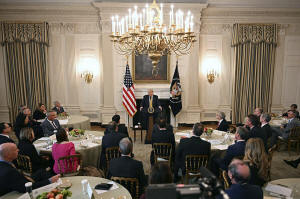Democratic governors balance whether to fight or pacify after Trump
threatens one of their own
 Send a link to a friend
Send a link to a friend
 [February 24, 2025]
By JOEY CAPPELLETTI [February 24, 2025]
By JOEY CAPPELLETTI
WASHINGTON (AP) — President Donald Trump's real-time confrontation with
Maine's governor over transgender athletes captured the conundrum many
Democratic governors are facing in the Republican's second term.
Gov. Janet Mills' vow that she would see Trump in court over his threat
to withhold money from the state if it didn't comply with his executive
order delighted Democrats who want more strident pushback. But the
dust-up that played out in the open Friday as Trump hosted governors at
the White House ticked off a president known to retaliate against people
he considers enemies.
Hours after the spat, the federal Department of Education announced it
was initiating an investigation into the Maine Department of Education
over the inclusion of trans athletes. Trump doesn't want them playing in
girls and women’s sports; Maine law bars discrimination based on gender
identity.
“Any time a public interaction like that takes place, it’s coming from a
person who’s grounded in their values,” Michigan Gov. Gretchen Whitmer
said in an interview Sunday. “I love Janet Mills and I appreciate her
for standing up. I also know that there’s always a cost that comes with
that.”
The Democrats who lead the nation's most populous states were in
Washington for a meeting of the National Governors Association, where
they tried to strike a balance between their states' needs and their
feelings about Trump.
Whitmer, known for clashing with Trump during his first term over the
federal COVID-19 response, campaigned vigorously against him in 2024 on
behalf of Democratic nominee Vice President Kamala Harris. Whitmer said
she sat next to Trump at a White House dinner on Saturday night.

“I was the only Democrat at the table. I was a little surprised. I think
everyone in the room was a little surprised, to be honest,” she said.
“But I took the opportunity to talk a little bit about tariffs.”
Michigan and other states could be significantly affected by some of the
president’s early proposals. For example, Michigan expects nearly 42% of
its budget to come from federal funds and relies heavily on trade with
Canada, which now faces potential Trump-imposed trade penalties.
A federal judge is considering a request to block the administration
from freezing trillions of dollars in grants and loans, a move that
could severely impact states. At the same time, Trump’s key ally, Elon
Musk, is pushing to shrink the federal government, with likely ripples
nationwide. About 80% of the roughly 2 million people in the federal
workforce live outside metro Washington, dispersed across the country.
“I’m very worried that people are going to make make decisions without a
real understanding of what the ramifications are going to be for the
American public,” Whitmer said. Musk, she said, is “dangerous.”
At discussion panels and news conferences at the meetings, state leaders
struck a conciliatory tone.
[to top of second column]
|

President Donald Trump speaks at the Governors Working Session in
the State Dining Room of the White House in Washington, Friday, Feb.
21, 2025. (Pool via AP)

“We always hope that people can disagree in a way that elevates the
discourse and tries to come to a common solution,” said Democratic
Gov. Jared Polis of Colorado, the association's chair, when asked
about the Trump-Mills exchange. “I don’t think that disagreement was
necessarily a model of that,” he said.
Gov. Kathy Hochul, D-N.Y., met with Trump for more than an hour on
Friday afternoon to discuss Manhattan’s congestion tolling. Trump
ordered a halt to the program, a key Hochul priority, and declared
in a social media post: “Long live the king!”
Asked about the meeting, Hochul told CBS' “Face the Nation” that it
was “adversarial” and said New Yorkers “need to know I’m willing to
take the fight wherever I have to.”
“We’re not going to sit idly by and let our rights be attacked,” she
said. “We’ll work with you when there’s common ground, no doubt
about it, let’s build great projects and infrastructure. There’s
areas where we’re going to work with you on immigration and getting
the violent criminals off our streets. We do not dispute that, but
don’t think that you can just come in and bully us around and not
expect a reaction from governors.”
Whitmer said she had a chance to speak with Defense Secretary Pete
Hegseth and Homeland Security Secretary Kristi Noem, in addition to
Trump.
“I’ve got to put the people’s interests before my own interests,
before my partisan interest. I got a job to do,” said Whitmer,
considered a top-tier potential candidate for the 2028 Democratic
nomination for president. “So even if it’s uncomfortable, even if,
you know, it’s all the all the things you would assume, on a
personal level, that’s second to my job as governor.”
Hundreds of miles from Washington, another 2028 contender took a
different direction.
Illinois Gov. JB Pritzker, in his State of the State address on
Wednesday, compared the Trump administration to the Nazi movement
and criticized members of his own party, declaring, “Going along to
get along does not work.”
Pritzker’s response resonated with some key voters.
“We didn’t elect Democrats to become collaborators with our
oppressors,” said Lori Goldman, founder of “Fems for Dems,” a
Michigan-based group focused on voter turnout.
“We are beyond angry and we are organizing against Democrats that
sell us out,” she said.
All contents © copyright 2025 Associated Press. All rights reserved
 |